Luke Kelly
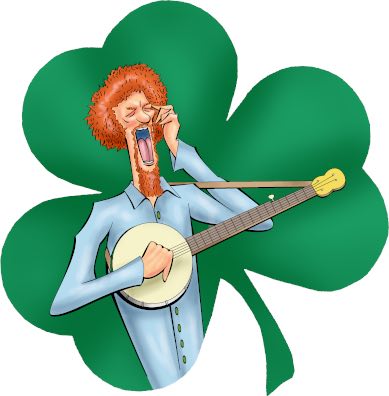
(Click to Zoom In and Out)
One of the best of the Irish balladeers was Luke Kelly. Although he did singing on his own most of his fame was as the lead singer of the Dubliners from the 1960's until his death in 1984.
Luke was born in Dublin in 1940 (the actual birthdate is a bit obscure). He dropped out of school when a teenager, and worked at a number of odd jobs in Ireland and then in England. But his natural singing voice made a music career almost inevitable and toting a five string banjo (rather than the four string tenor instrument usual in Irish music) he began singing on the street corners - a form of performance quite common throughout 20th century Britain and Ireland. Ironically he also began to play golf which was not a stereotypical pastime for a young man of decidedly leftist leanings and who had joined the Young Communists League.
After returning to Ireland, Luke continued his singing and met Ronnie Drew and Barney McKenna in the Dublin pubs. Later the Ronnie Drew Group (as it was called) was fortified by Ciarán Bourke - who because of his university degree took a lot of good natured ribbing from his band mates - and by master fiddler John Sheahan. But the name "The Ronnie Drew Group" just didn't have the right ring to it and they became The Dubliners.
The Dubliners became regular performers at O'Donoghue's Pub near St. Stephen's Green, an establishment as famed for its music as its potables. Ronnie would still usually assume the part of emcee and after Luke died he did more of the lead singing even though he didn't have the classic balladeer voice as his timbre was likened to the sound of coal scraping underneath a door.
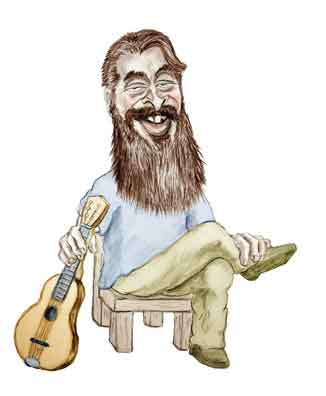
Ronnie Drew
Not classic timbre.
The Dubliners released their first album in 1964 but probably their first really popular international release was More of the Hard Stuff. Luke sings lead on many of the tracks, swapping off with Ronnie. By the turn of the Millennium the Dubliners had nearly 40 albums to their credit.
Some of their songs were winkable such as "Seven Drunken Nights, a traditional song which has since become an Irish folk staple. Each verse refers to a night where a neglectful husband gets home and finds evidence of - ah - "activity" - at his home while he's been at the pub.
Oh, as I went home on Monday night
As drunk as drunk could be
I saw a horse outside the door
Where my old horse should be.
Well, I called to me wife and I said to her
"Will you kindly tell to me
Who owns that horse outside the door
Where my old horse should be?"
Well, you're drunk, you're drunk you silly old fool
And still you cannot see
That's a lovely sow that my mother sent to me.
Well, it's many a day I've traveled, a hundred miles or more
But a saddle on a sow, sure, I never saw before.
The group had originally intended to sing the song on the Ed Sullivan Show, but those were more delicate days. When Ed heard the group in rehearsal he swore they'd never play on his program. So they switched to a most credible rendering of "Muirsheen Durkin" of which Ed had no objection.
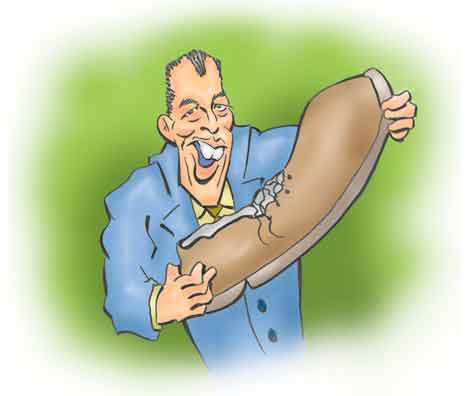
Ed Sullivan
He had no objection.
Although known for his Irish traditional music, Luke's own tastes of popular music was wide. Of course, he was heavily influenced by the folk singers of the time such as Pete Seeger and Ewan McColl. It's not really a surprise to learn he was a fan of jazz but he also enjoyed listening to singers as varied as Frank Sinatra and Pat Boone.
Luke would sometimes branch out on his own and one of his notable albeit unusual performances was the role of Herod in a production of Jesus Christ Superstar in Dublin's Gaiety Theater in 1973. He said he found the part was particularly difficult. You not only had to sing but you had to dance at the same time. So in the show he had to remember not just the words but where his feet went. Nonetheless Luke acquitted himself well.
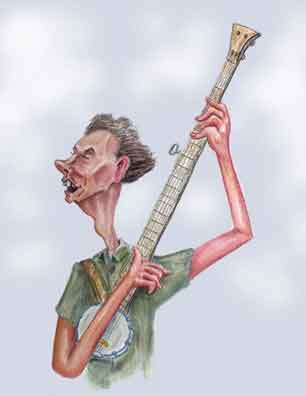
Pete
and
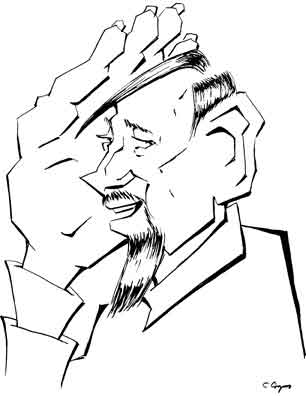
Ewan
Influences
Those who knew Luke mentioned there was a side to his personality that wasn't evident if all you saw was the fiery singer of "The Molly McGuries". He was extremely generous with time and money and once paid off the mortgage of a friend who had met with financial reverses. When a family's home burned down, he let them move in with him temporarily - "temporarily" being ten years.
Luke's performing and celebratory nature naturally made for a rough lifestyle and he was known to take as much ale as was good for him. In the late 1970's he was having trouble remembering things and had been suffering from headaches when in 1980 he collapsed during a performance. A brain tumor was diagnosed and following an operation he had to cut back on the amount and rigor of his performing. There were subsequent operations and Luke died in 1984. Like many Irish heroes, he's buried in Glasnevin Cemetery in Dublin.
The Dubliner's kept going for another 26 years with the membership being augmented with Bob Lynch, Paddy Reilly, Eamonn Campbell, Patsy Watchorn, and Jim McCann. Of the original members, Ciarán died 1988 and Ronnie and Barney in 2008. John continues to perform.
References
"Luke Kelly", It's the Dubliners.
"Luke Kelly", Raidió Teilifís Éireann.
Ireland’s Red Troubadour, Ronan Burtenshaw, Jacobin Magazine, March 17, 2018.
"The Gospel According to Luke", Siobhá"n Long", The Irish Times, Octobr 9, 2004.
"Luke Kelly", The Newport Folk Festival Songbook, Jean Ritchie (Editor), David Gahr (Photographs), Pete Seeger (Forward), Alfred Music Company, Inc., 1965.
"The Dubliners", Discogs.
"The Dubliners", AllMusic.
"Luke Kelly", Documentary, Raidió Teilifís Éireann.
"Luke Kelly", Find-a-Grave, William Veselik, Memorial 25736526, April 4, 2008.